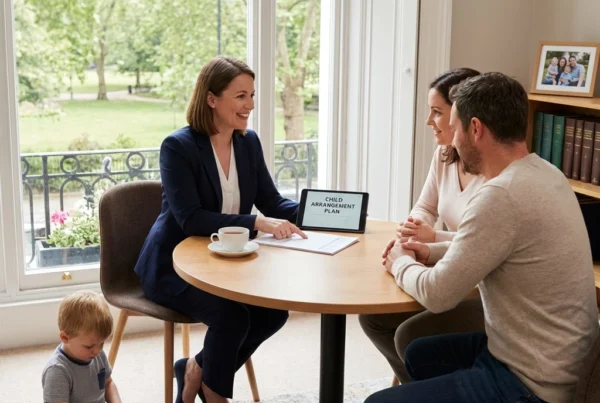When parents separate or divorce, one of their biggest concerns is what happens to their children. While most people call it "child custody," courts actually use the term "Child Arrangements Orders." Understanding how family law solicitors handle these sensitive cases can help you navigate what's often an emotionally challenging time with greater confidence.
At Judge Law, we've seen first-hand how the right legal support can make all the difference, not just in achieving fair outcomes, but in protecting your children's wellbeing throughout the process.
What Is a Child Arrangements Order?
A Child Arrangements Order is a court order that decides two key things:
- Where your child will live (previously called "residence")
- Who your child will spend time with (previously called "contact")
These orders replace the old system of custody and access, focusing instead on practical arrangements that serve your child's best interests. Parents and others with parental responsibility can apply directly. Other relatives, such as grandparents, can often apply with the court’s permission.
Agreement vs Court Process: Understanding Your Options
Most family law firms will first explore whether you can reach an agreement without going to court. Here's how the two approaches compare:
Private Agreements:
- Faster and less expensive
- You maintain control over decisions
- More flexible arrangements
- Less stressful for children
- Can be changed more easily by mutual consent
Court Orders:
- Legally binding and enforceable
- Provides certainty if the other parent is uncooperative
- Court-approved arrangements carry legal weight
- Takes longer (typically 6-12 months)
- More expensive due to court fees and legal representation
The best family law solicitors will always encourage parents to try mediation or collaborative approaches first, only recommending court proceedings when other options have been exhausted or when urgent protection is needed.
First Steps with a Family Law Solicitor
When you first meet with a family law solicitor about child arrangements, expect a thorough but sensitive assessment. Your solicitor will:
Listen to your concerns about your children's welfare and your specific situation. Everything you discuss is confidential and protected by professional privilege.
Assess the current arrangements and identify what's working well and what needs to change. This includes understanding your children's routines, school arrangements, and relationships with both parents.
Set realistic expectations about timescales, costs, and likely outcomes. Good solicitors won't promise unrealistic results or suggest that court is about "winning" against the other parent.
Explain your options from informal agreements and mediation through to court applications, helping you understand the pros and cons of each approach.
When Agreements Break Down
Even well-intentioned agreements can fail, and family law firms regularly handle these challenging situations:
What happens if the other parent refuses contact? Your solicitor can apply for a Child Arrangements Order to establish legally binding contact arrangements. If there's persistent refusal, enforcement proceedings may be necessary.
What if one parent repeatedly cancels? Consistent cancellations can be addressed through court orders that specify consequences for breaches. Your solicitor will help document the pattern of cancellations as evidence.
What if there is parental alienation? This is when one parent undermines the child's relationship with the other parent. Family law firms work with specialist professionals to identify and address alienation, which courts take very seriously.
How Evidence Is Handled
Family law solicitors understand that strong evidence is crucial for Child Arrangements Orders. They'll help you gather and present:
Communication records: Text messages, emails, and phone records showing attempts at contact or arrangements.
Diary logs: Detailed records of when contact was supposed to happen, cancellations, and your child's reactions.
School and medical records: Evidence of your involvement in your child's education and healthcare.
Professional reports: From social workers, child psychologists, or family therapists when relevant.
Your solicitor will ensure all evidence is properly formatted and legally admissible, presenting it in a way that focuses on your child's welfare rather than criticism of the other parent.
The Legal Process and Welfare Checklist
When cases do go to court, it's important to understand that this isn't about one parent "winning" against another. Courts follow the welfare checklist, considering:
- Safety: Is the child safe with each parent?
- Needs: What are the child's emotional, physical, and educational needs?
- Age and maturity: What are the child's own wishes (depending on their age)?
- Routines: How would different arrangements affect the child's stability?
- Impact of change: What effect would altering current arrangements have?(simplified list)
Family law solicitors prepare their clients for this focus on child welfare, helping them present evidence that demonstrates their ability to meet their children's needs.
When Urgent Action Is Needed
Sometimes family law firms need to act quickly to protect children. This might involve:
Emergency court hearings for urgent child protection issues or when a parent threatens to remove a child from the country.
Non-molestation orders to protect children (and parents) from domestic abuse.
Prohibited steps orders to prevent a parent from taking specific actions, such as removing a child from school or moving abroad.
At Judge Law, we understand that family emergencies don't follow office hours. Our team can provide immediate advice on safeguarding concerns and urgent applications when your children's safety is at risk.
Supporting Families Throughout the Process

Good family law firms provide ongoing support beyond just legal advice:
Clear communication about what's happening at each stage and what to expect next.
Emotional reassurance during what's often one of the most stressful periods in a parent's life.
Coordination with other professionals such as mediators, counselors, or child specialists when needed.
Realistic guidance about timescales, costs, and likely outcomes throughout the process.
Why Full-Service Firms Like Judge Law Make a Difference
Working with a comprehensive family law firm offers distinct advantages:
Immediate expertise in related areas like domestic abuse, emergency orders, and safeguarding concerns means you get specialized advice quickly.
Joined-up support when financial settlements, property disputes, or housing issues overlap with child arrangements, common in divorce cases.
Consistent representation from your first consultation through to final agreements, building trust and understanding of your specific circumstances.
Local knowledge of Windsor and London family courts, judges, and local procedures that can benefit your case.
What Parents Often Find Most Helpful
Based on our experience at Judge Law, parents consistently value:
Clarity about the legal process and what to expect at each stage, removing uncertainty during an already difficult time.
Realistic expectations about timescales, costs, and likely outcomes rather than false promises.
Skilled representation in court that focuses on children's welfare rather than point-scoring against the other parent.
Practical advice about managing arrangements day-to-day and communicating effectively with the other parent.
Frequently Asked Questions
How much do Child Arrangements Order applications cost? Court fees are currently £263, but total costs including legal representation typically range from £3,000-£15,000 depending on complexity. Many cases settle through mediation for significantly less.
How long does the process take? Simple agreed applications can take 2-3 months, while contested cases typically take 6-12 months. Complex cases involving domestic abuse or international elements may take longer.
What if the other parent doesn't follow the order? Child Arrangements Orders are legally enforceable. Persistent breaches can result in fines, community service, or even imprisonment in serious cases.
Can arrangements be changed later? Yes, if circumstances change significantly. Courts prefer parents to try mediation first before applying to vary existing orders.
Moving Forward with Confidence
Child arrangements cases are never just about legal procedures: they're about protecting your children's future and maintaining important family relationships. The right legal support helps you navigate complex emotions and legal requirements while keeping your children's welfare at the center of everything.
At Judge Law, we've guided hundreds of families through child arrangement proceedings across Windsor and London. We understand that every family situation is unique, and we're committed to providing the practical guidance and clear communication you need during this challenging time.
Speak to a family law solicitor today in confidence. We offer practical guidance, clear communication and support when you need it most. Contact Judge Law to discuss your specific circumstances and explore the best path forward for your family.





